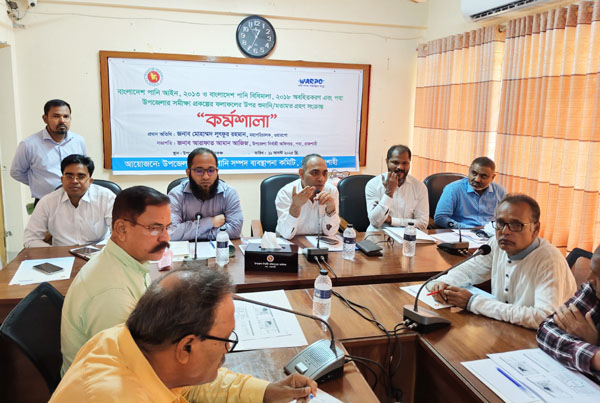News Flash

RAJSHAHI, Aug 11, 2025 (BSS)- Water resource management in the Rajshahi
Barind region is crucial due to declining groundwater levels, exacerbated by
climate change and unsustainable irrigation practices.
A holistic approach is needed, focusing on surface water conservation,
efficient supply, demand management, and community involvement to ensure
sustainable water resources for the region.
Experts and researchers came up with the observations while addressing an
advocacy workshop titled "Bangladesh Water Law, 2013 and Water Rules, 2018"
here today.
Water Resources Planning Organization (WARPO) and Upazila Integrated Water
Resource Management Committee jointly organised the workshop at Paba Upazila
Parishad Hall Room in the district.
WARPO Director General Muhammad Lutfor Rahman addressed the meeting as the
chief guest virtually while Upazila Nirbahi Officer (UNO) Arafat Aman Aziz
was in the chair.
WARPO Director Shah Muzahid Uddin welcomed the participants stressing the
need for ensuring water resource management through proper implementation of
water law and rules.
Assistant Commissioner (Land) Zahid Hassan, Upazila Agriculture Officer Abdul
Mannan, Upazila BMDA Engineer Zamilur Rahman and President of Heritage,
Rajshahi Mahbub Siddiqui also spoke on the occasion.
The meeting was told that the over-extraction of groundwater for irrigation
is a major issue, leading to declining water tables. Droughts and erratic
rainfall patterns due to climate change are intensifying water scarcity.
In his remarks, Lutfor Rahman said inadequate water management practices,
including inefficient irrigation methods, contribute to water wastage.
Conversion of wetlands and water bodies for agriculture and other purposes
reduces surface water storage.
Besides, insufficient coordination between different stakeholders and lack of
a comprehensive management plan hinder effective water management.
He, however, said adopting a holistic approach that considers ecological,
social, and economic needs is needed.
Re-excavating canals, ponds, and other water bodies has become crucial to
increase surface water storage and promote surface water irrigation.
Apart from implementing techniques to replenish groundwater reserves, such as
rainwater harvesting and artificial recharge, promoting the use of water-
efficient irrigation systems like drip irrigation and adopting water-saving
agricultural practices can be the effective means of mitigating the problem.
Mahbub Siddiqui said involving local communities in water management planning
and implementation through participatory rural appraisal (PRA) and other
methods is required.
Side by side with raising public awareness about water conservation and the
importance of sustainable water management practices, time has come to
empower local government institutions and IWRM committees to manage water
resources at the local level.
Emphasis should also be given on establishing a system for monitoring water
resources and evaluating the effectiveness of management interventions.